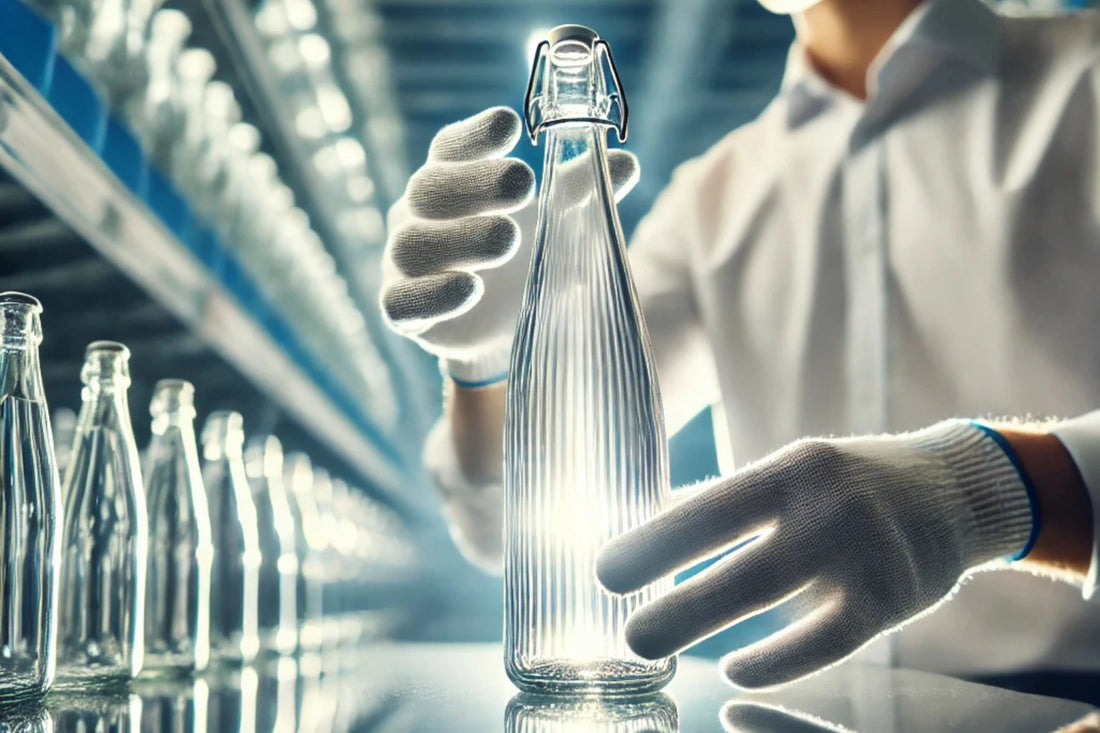Glass bottles are a staple of industries ranging from personal care to food packaging. However, choosing the right bottles involves more than selecting a pretty container. High-quality glass bottles ensure durability, safety, and visual appeal, making them indispensable for both consumer trust and product integrity. Let's explore how to identify the healthiest choice in glassware, ensuring your products meet the strictest standards.
Key Characteristics of High-Quality Glassware
1. Material Composition
The quality of glass bottles begins with the materials used. High-quality glassware is often made from soda-lime, flint glass, or borosilicate glass, with flint glass being prized for its clarity and precision. These materials ensure the safest glass for food packaging and cosmetic use, minimizing long-term exposure risks such as cadmium exposure.
2. Durability and Strength
Bottle manufacturers often emphasize moderate durability for general applications, but premium bottles undergo an inspection process to test their resistance to breakage. The molten glass is carefully refined during production, creating bottles with greater product durability.
3. Visual Appeal and Transparency
The aesthetic appeal of a bottle plays a crucial role in meeting consumer expectations. As a consumer, you should also check for a uniform finish without streaks, bubbles, or defects in glass bottles. The clarity of white glass or the rich tones of black glass adds to the aesthetic and functional value, especially in intricate designs used for premium packaging.
Functional Features to Look For
Neck Finish and Threading
Precision in the neck’s glass structure ensures a proper fit for closures, reducing leaks. Bottle measurements should adhere to exacting standards to maintain compatibility with caps and sprayers.
Seamless Bottle Surfaces
Smooth, even surfaces are an indicator of quality. The blown glass technique is often used for high-quality bottles, providing a flawless appearance without weak points.
UV Protection in Colored Bottles
Amber and green bottles offer natural UV protection, critical for products like essential oils. This functional feature goes hand-in-hand with compliance with quality standards for product longevity.
Certifications and Standards
Food-Safe and Food-Grade Certifications
For bottles used in food packaging, compliance with food-grade regulations is non-negotiable. The FDA and ISO certifications ensure that these bottles meet stricter standards for safety and hygiene.
Quality Control Process
Glass bottle production for high-quality glassware involves rigorous quality control processes, including manual inspection. Experienced inspectors assess the glass structure, bottle surfaces, and intricate designs for flaws before approving products for sale.
Common Defects in Glass Bottles and How to Spot Them
- Cracks or Bubbles: Weakens product durability and compromises the bottle’s safety.
- Uneven Coloring: Indicates inconsistencies in molten glass processing.
- Misaligned Threading: Causes leakage and compatibility issues with closures.
Always perform a thorough inspection process or request documentation from the supplier for added assurance.
Tips for Sourcing High-Quality Glass Bottles
1. Research Trusted Glass Bottle Manufacturers
Partnering with established manufacturers in North America ensures adherence to compliance with quality standards. Look for suppliers who demonstrate transparency in their quality control processes.
2. Request Samples for Testing
Evaluate product durability, measurements, and visual appeal by testing samples before committing to bulk orders.
3. Choose the Right Class of Bottles
Understanding your product needs helps narrow down choices. For example:
- Flint glass for its clarity and elegance.
- Black glass for UV protection and premium branding.
- Moderate durability for lightweight packaging.
Frequently Asked Questions
What is the healthiest choice for glassware?
Glass bottles made from lead-free and cadmium-free materials are the safest glass for food and cosmetic packaging.
How is glass bottle quality control maintained?
Manufacturers use a combination of automated and manual inspection to ensure exacting standards are met.
Are all glass bottles food-safe?
No, only bottles labeled as food-grade or compliant with food-safe certifications are suitable for food packaging.
Why Choose The Bottle Depot for High-Quality Glass Bottles
For over six years, The Bottle Depot has been a trusted supplier of high-quality glass bottles in North America. Our products undergo a rigorous glass bottle inspection process, ensuring compliance with quality standards and optimal product durability.
With a wide selection of flint glass, white glass, and black glass bottles in various sizes and designs, we help businesses find the healthiest choice for their packaging needs. Browse our collection today to elevate your brand with premium glassware!
To wrap
Investing in high-quality glass bottles is a smart decision for businesses seeking durable, visually appealing, and safe packaging solutions. By focusing on the characteristics and quality control processes outlined above, you can confidently choose bottles that meet your needs while building consumer trust.
Browse high-quality glassware at The Bottle Depot today and experience the difference!




